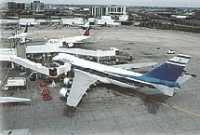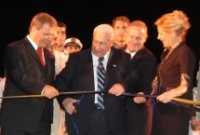The government announced last week an historic change of policy in which the transport minister lost exclusive control of aviation policy. The government said that the Ministries of Finance, Transport, and Tourism had agreed the change of policy in their discussions on the economic arrangements bill.
Transportation Minister Meir Sheetrit agreed at the end of the discussions that he would no longer enjoy sole responsibility for setting policies regarding civil aviation. The minister of transport will be required to consult a committee of ministerial directors in determining Israel’s civil aviation policy.
The committee will include the director generals of the Ministries of Transport and Tourism, and representatives of the Ministry of Finance Budget Department, the Prime Minister’s Office, and the Israel Civil Aviation Authority (ICAA).
According to the agreement, in granting permits to airlines to fly to Israel, the old and controversial pretext of "acting in the best interest of the state" would be removed and replaced by a condition that the permit would not compromise fair competition and introduce low fares which the local airline's could not match.
A spokesman for the Tourism Ministry said last week, "We are very pleased. It isn't possible to close the skies," a reference to the open skies policy it advocates, which would allow more airlines to offer more flights.
Mr. Eli Cohen, Director General of the Tourism Ministry, said in a press interview shortly before the agreement had been made, that the changes in civil aviation policy are the most important reforms in the 2006 budget. An open sky policy would earn an extra $1 billion in revenue to the state from the 500,000 additional tourists which are expected to come.
Transport minister to lose control over aviation policy
Transportation Minister Meir Sheetrit agreed at the end of the discussions that he would no longer enjoy sole responsibility for setting policies regarding civil aviation
15.08.05 / 00:00
•
More articles that may interest you

Port of Haifa wishes to increase cooperation with main Greek ports

Israel Tax Authority : Imports in July up by 36%

Ayalon Expressway to be extended past Netanya

Airport Authority's 2005-6 development budget - NIS 316m

Maersk Sealand – improved service to Israel

The new "Eitan" port was inaugurated last week
More news from Air Transport Section
>El Al to increase frequency: 10 flights per week to Belgium/08.08.05
>El Al and Austrian Airlines will add two weekly flights/01.08.05
>January – June 2005 – 6% drop in air cargo moving through Ben Gurion Airport/18.07.05
>Brosh: ICAA's outdated aviation policy costs Israel over $200m a year/18.07.05
>Swissport International Ltd given go ahead for second air cargo terminal in Israel/04.07.05
>Austrian Airlines - High Court imposes settlement on flight dispute/20.06.05
>Eilat – new international airport approved/13.06.05
>Ashdod Bonded Ltd officially inaugurated its airport cargo terminal/13.06.05
>Maman signed distribution agreement with HPL - Hellman Pharmatzetical Logistics/13.06.05
>Austrian Airlines in move to settle differences with Civil Aviation Authority/13.06.05
